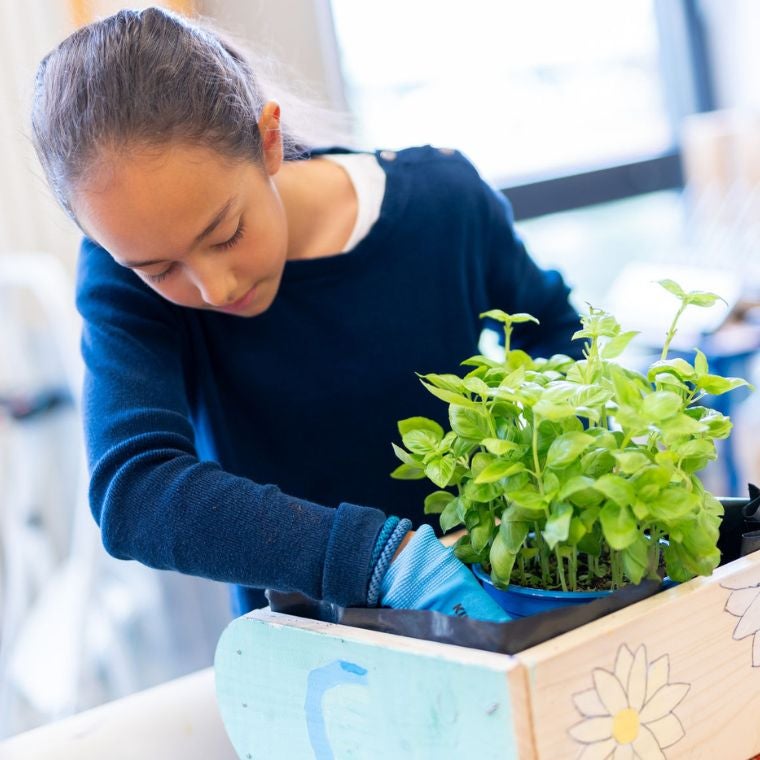PPG and the PPG Foundation are on track to invest $5 million by 2030 in environmental sustainability education. According to Malesia Dunn, executive director, PPG Foundation and corporate global social responsibility, this investment not only aligns with PPG’s 2030 sustainability targets and priorities, it also builds the next generation of diverse and innovative leaders in science, technology, engineering and mathematics (STEM).
Future environmental innovators start with STEM

“Education is one of three giving focus areas for PPG and the PPG Foundation because we know how important a skilled STEM workforce is to create stronger, more sustainable communities,” said Dunn.
“Environmental sustainability education is a natural extension of our commitment to STEM learning. From the scientific study of how climate change impacts our lives, to new renewable technologies that advance energy efficiencies, to engineering new systems for better waste management – it’s all connected.”
Environmental Sustainability Education Partners
We invest in educational programs that meet the specific environmental needs of our communities and address decarbonization and the circular economy.
Read on to learn more about recent partnerships.
National Environmental Education Foundation
The PPG Foundation teamed up with the National Environmental Education Foundation (NEEF) to implement NEEF’s Greening STEM approach in Pittsburgh, Pennsylvania, and East Point, Georgia. Greening STEM engages high-need youth in hands-on environmental investigations in their communities—making STEM relevant and connected to students’ daily lives and providing career exploration opportunities.
NEEF developed a partnership with the Pittsburgh Parks Conservancy (PPC) to bring nature-filled learning to two local schools. One activity brought students to a stream to learn about local ecosystems and the functioning of a surrounding watershed. Back in the classroom, the students carried this hands-on experience into a lesson on microplastics and their role in watersheds.
Foundation for Environmental Education
PPG is investing in the Foundation for Environmental Education (FEE), a global leader in environmental education and sustainable development, for a two-year partnership to promote climate change education as part of UNESCO’s Greening Education Partnership (GEP).
Junior-Uni Wuppertal
PPG has proudly supported Junior Uni Wuppertal, an innovative after-school educational institution in Germany, for more than five years. Over the past year, our focus has been on advancing environmental education to inspire children and young adults (ages 4-20) to address global challenges like climate change.
With PPG’s support, Junior-Uni hosted 12 engaging sustainability-focused courses in 2024, reaching over 150 participants. Through hands-on, age-appropriate programs on topics like upcycling, herbal science, water research and chemistry, young learners gained valuable knowledge and skills to build a sustainable future.
The PPG grant supports FEE’s mission to address the urgent need for climate change education in schools around the world. The funding will facilitate the creation of new educational materials, including Eco-Schools handbooks, instructional videos, online courses, and teacher training materials – all available in multiple languages to ensure global accessibility and impact.
National Energy Education Development
The National Energy Education Development (NEED) and PPG recently delivered teacher workshops in four U.S. markets that assisted grades sixth to eighth educators in building content knowledge and capabilities for teaching energy topics in the classroom.
As part of the workshops, teachers participated in sessions focused on energy efficiency, renewable energy and climate change to take resources back to their schools. Some sessions included PPG speakers for a connection to industry.
Attitude for the Planet program with Junior Achievement
PPG helped with this training program for high school students in public schools in Sumaré, Brazil. With classes taught by PPG employee volunteers who served as teachers for a day, the Attitude for the Planet program addressed the social, economic and environmental aspects of sustainability with 60 high school students.
